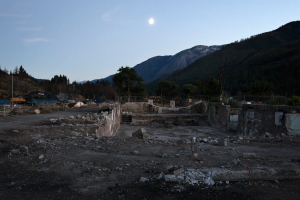Prof. Kathryn Harrison comments on the consequences of BC’s record fossil fuel export revenues
“I think at minimum we need to be making economic plans, with a longer-term view,” said Prof. Harrison about BC’s provincial energy and climate plans, “that are anticipating what could happen to the international markets for our fossil fuel exports.”
Op-Ed: Prof. Kathryn Harrison writes that LNG Canada is “bullying provincial and federal governments”
“LNG Canada’s project cleared federal and provincial environmental assessments in 2015. However, both levels of government still have options to ensure that this project only proceeds if it’s consistent with climate goals,” write Prof. Kathryn Harrison and colleague Karen Tam Wu.
Prof. Kathryn Harrison discusses what Canada and China co-hosting COP15 means for climate politics
Prof. Harrison reminds readers that “it’s easy to underestimate how many people there are at these meetings who are deeply committed to trying to move things forward in a positive way and who really care about climate and biodiversity,” despite the political tension present.
Prof. Kathryn Harrison comments on the “rise in illegal deeds as a form of activism”
“I think my concern with this form of civil disobedience,” says Prof. Harrison, “is that the connection to the actions that they are trying to get from governments from their fellow citizens is not clear enough.” She acknowledges the activists’ goals, but notes that their actions may actually have an opposite effect.
Prof. Kathryn Harrison co-authors article on the future of Canada’s energy sector
Prof. Kathryn Harrison collaborated with Prof. Simon Donner on a piece that highlighted the challenges ahead for Canada’s energy sector. “The differences in energy demand across scenarios are significant, both for the planet, and for Canadian oil and gas producers,” they write.
Prof. Kathryn Harrison on the boldness, riskiness, and power of activism in climate politics
“Civil disobedience is an act of public communication,” Prof. Harrison says in this CBC article. “It’s someone saying, ‘I am so frightened or I am so disturbed by an injustice that I am willing to put myself on the line to try to change your mind,’”
Prof. Kathryn Harrison discusses Canadian climate politics under the Trudeau government
The current Trudeau government has been slow to act on environmental policy, despite the Prime Minister touting Canada as a leader in the fight against climate change. While this may be true, both Trudeau and Prof. Kathryn Harrison acknowledge that “[Canada’s] track record is not good.”
Prof. Kathryn Harrison says that Pierre Poilievre is clearly “not trying for climate concerned voters”
Prof. Harrison notes that policy on climate action is already a “particularly tough issue” for Canadian Conservatives. But while Erin O’Toole still tried to make the party more climate-friendly, Pierre Poilievre has no interest in even pretending to have a climate plan, with his loud support for pipelines, removal of carbon taxes, and more.
Prof. Kathryn Harrison highlights the potential impact of a Vancouver lawsuit against fossil-fuel companies
A specialist on environmental policy, Prof. Kathryn Harrison says that a lawsuit would be monumental, considering that ““the fossil fuel industry still holds a very privileged position in Canadian politics.” The Vancouver council has established a plan to fund the lawsuit, but the new council is yet to confirm it.
Prof. Kathryn Harrison says that a one-cent-per-litre increase in gas prices is a small price to pay to reduce greenhouse gas emissions
Expanding refineries and low-carbon fuel plans could make BC fuel more expensive, but “to fix climate change, we’re all going to need to be part of that transition (to sustainable energy sources). And I think there’s still a level of denial about that,” Prof. Kathryn Harrison said. “We tend to focus on the costs and not think about the consequences of inaction.”









